
Vol.11 No.3

Abstract
The present study examines the impact of value co-creation on satisfaction and intention to adopt of e-resources among users. Four components of the DART model have been adopted to describe value co-creation. These components are dialogue, access, risk-assessment, and transparency. Ph.D. scholars and faculty members from National Capital Region, India, were requested to respond on a five-point Likert scale. A total of 220 responses were collected with the help of a structured questionnaire from respondents of the top 50 business schools according to National Institute Ranking Framework. These responses have been analysed by means of structured equation modelling on Adanco 2.2 software. Findings of the study reported the insignificant impact of access and risk-assessment, and positive impact of dialogue and transparency on satisfaction. Further, satisfaction has been identified, creating significant impact on adoption of e-resources. Such findings reflect the real picture of customer experience with respect to their role in co-creation of e-resources. Respondents have conveyed their dissatisfaction with the cocreation process of e-resources, as companies do not provide all the information and access to their customers beforehand. Consequently, customers fail to make informed decisions and also find themselves unable to show trust in the service providers of e-resources.



Abstract
Record management, especially in schools as an institution’s information centre, needs serious attention from government agencies. Under record management policy, there needs to be practical guidance on record management specific to schools. This paper aims to construct a record management model based on the Eight Indonesian Education Standards to support school accountability in Indonesia. The urgency of this paper in filling the gap in the Electronic Record Management System (ERMS) role is primarily to support school accountability. It is important to include educational laws and regulations in Indonesia to be a foundation in archive management, including preparing the ERMS. This study aims to develop a model of record management in schools. The final stage in this research is to find the final model. The final model is a model that experts and practitioners have validated. A total of 30 records managers were selected for the interviews. Furthermore, the trial was carried out in 30 senior high schools. The research sampling consisted of representatives of archive managers at selected schools from five islands in Indonesia (Kalimantan, Java, Papua, Sumatra, and Sulawesi). Our research findings show that conceptual models meet valid criteria and significantly impact archivist performance in better schools. The practical implication is that the archival management model based on national education standards policies contributes to practical archives and records management to support school accountability.

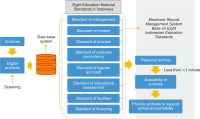
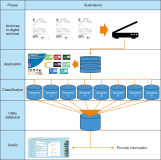

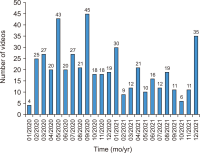
Abstract
This study explored issues related to the library in the COVID-19 era in YouTube videos in Korea. This study performed social network analysis and topic modeling analysis by collecting 479 YouTube videos, 20,545 words, and 8,379 channels related to COVID-19 and the library from 2019 to 2020. The study results confirmed that YouTube, a social media platform, was used as an important medium to connect users and physical libraries and provide/promote online library services. In the study, major topics and keywords such as quarantine, vlog, and library identity during the COVID-19 pandemic, library services and functions, and introductions and user guides of libraries were derived. Additionally, it was identified that videos about COVID-19 and the library are being produced by various actors (news and media channels, libraries, government agencies, librarians, and individual users). However, the study also identified that the actor network is fragmented through the channel network, showing a low density or weak linkage, and that the centrality of the library in the actor network is weak.

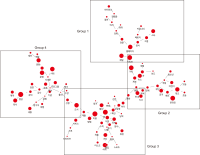
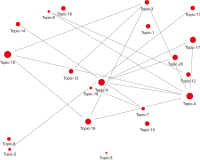


Abstract
Government codes are created and utilized to streamline and standardize government administrative procedures. They are generally employed in government information systems. Because they are included in open datasets of public data, users must be able to understand them. However, information that can be used to comprehend administrative code is lost during the process of releasing data in the government system, making it difficult for data consumers to grasp the code and limiting the connection or convergence of different datasets that use the same code.This study proposes a way to employ the administrative code produced by the Korean government as a standard in a public data environment on a regular basis. Because consumers of public data are barred from accessing government systems, a means of universal access to administrative code is required. An ontology model is used to represent the administrative code’s data structure and meaning, and the full administrative code is built as a knowledge graph. The knowledge graph thus created is used to assess the accuracy and connection of administrative codes in public data. The method proposed in this study has the potential to increase the quality of coded information in public data as well as data connectivity.





Abstract
This study aimed to discover the notable experiences of Library and Information Science students in a virtual internship program. It employed qualitative descriptive research design by thematically analyzing the monthly internship journal of the interns. Using Colaizzi’s method to identify themes from their experiences, the study revealed that interns expected to gain knowledge and skills on operations, services, and new information communication technologies in libraries. Orientation was found helpful in identifying the things interns needed to prepare. The interns faced issues from procrastination and technical difficulties, which they coped with employing avoidance strategies. Overall, the internship was viewed as an opportunity to learn and navigate the online digital system of the library despite the coronavirus disease 2019 pandemic. They realized their capacity and reflected on which competencies need improvement. In conclusion, students still learned the necessary knowledge and skills of a librarian; experienced the challenges faced in an actual library and were provided with various opportunities and realizations regarding the practice of librarianship. This study proposed a three-stage framework that outlines the involvement of the supervising instructors, librarians, and interns in the internship program from the preparation to the process and post-assessment.

Abstract
The storage of data documentation for Myanmar pagodas has various issues, and its retrieval method causes problems for users and libraries. This study utilized a mixed-methods approach, combining qualitative and quantitative methods to investigate pagoda data management in Myanmar libraries. The study aims to achieve the following objectives: to study the library collection management of pagodas in Myanmar, to investigate the management of pagoda data in Myanmar libraries, and to identify the pagoda data requirements for metadata development from the library professional perspective. The study findings revealed several challenges facing librarians and library users in accessing and managing Myanmar pagoda data, including limited stocks and retrieval tools, difficulty in accessing all available data online, and a lack of a centralized database or repository for storing and retrieving pagoda data. The study recommends the establishment of metadata criteria for managing a set of pagoda data and improving access to technology to address these challenges.
